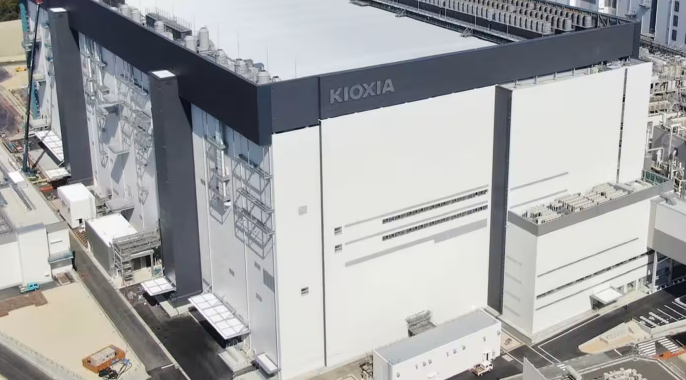
-advertisement-
Japanese memory chip maker Kioxia Holdings has ended production cuts after 20 months in light of a recovering market, with lenders agreeing to a new line of credit.
Kioxia in June raised operating rates on production lines back to 100% at its Yokkaichi plant, in Mie prefecture, and at its Kitakami plant, in Iwate prefecture. Both produce NAND flash memory.
As business improves, creditor banks have agreed to refinance 540 billion yen ($3.43 billion) in loans coming due in June. They will also set up a new line of credit totaling 210 billion yen.

The company, formerly Toshiba Memory, resorted to production cuts in October 2022 in response to sluggish demand for its mainstay smartphone products, with the size of the cuts exceeding 30% at one point. The start of operations at a new fab at the Kitakami site has been postponed from the originally scheduled 2023 to at least 2025.
Now market conditions are improving. Kioxia reported a net profit of 10.3 billion yen for the January-March quarter -- the first black ink in six quarters.
Demand for chips used in smartphones and personal computers bottomed out, while orders related to data centers grew. NAND prices in the April-June quarter are projected to rise 13% to 18% from the previous quarter, according to Taiwan-based research firm TrendForce.
Kioxia, along with Western Digital, plans to invest a total of 729 billion yen for mass production of advanced memory products. Japan's Ministry of Economy, Trade and Industry will provide up to 243 billion yen, or a one-third of the total, in subsidies, but the partners had to come up with the rest.
Kioxia was approved for listing on the Tokyo Stock Exchange in 2020, but the plan was postponed over subsequent U.S.-China trade frictions and deteriorating market conditions.
In 2023, Kioxia negotiated a business integration with WD's memory business, but the talks were called off that October. Kioxia has signaled that it is prioritizing listing on the market for now.
Kioxia has explained its listing plan to the banking syndicate and is intent on raising the necessary funds from the market. This seems to have heartened the lenders as well. Currently, as a privately held company, Kioxia is reliant largely on bank lending.
Editor:Vicky
▼▼▼
Oregon confirms chip-based subsidies worth $36m
Toshiba to invest ¥100 bil in power semiconductors over 3 years
Onsemi cuts 1,000 jobs globally
U.S.-Japan foundry cooperation intensifies: a threat to Samsung Electronics?
Siltronic opens $2.2 billion wafer fab In Singapore amid booming chip demand
MKS Instruments set to build a super center factory in Malaysia
+86 191 9627 2716
+86 181 7379 0595
8:30 a.m. to 5:30 p.m., Monday to Friday
